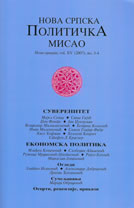| NSPM in English | |||
A matter of justice |
 |
 |
 |
| субота, 02. август 2008. | |
|
Despite significant pressure from the United States, Britain, France and Germany, in the six months since it declared independence Kosovo has been recognised by just 43 of the 192 members of the United Nations. While this tally includes many of the world's most influential states – including 20 of the 27 members of the European Union, and other leading western states such as Canada and Australia – support from elsewhere has been marginal. Kosovo has been recognised by just six states from south and central America and Africa. Asian endorsements stand at Japan, South Korea, Afghanistan and a couple of Pacific microstates. This low count reflects a deep sense of concern over Kosovo's legal right to independence. While those states that have recognised it argue that Kosovo represents a unique case in international politics, most countries evidently continue to harbour real doubts about recognising a move that has not been accepted by Serbia (the state on whose territory Kosovo has been created), or endorsed by the UN security council. It is against this backdrop that Serbia is now preparing to launch its most significant and controversial diplomatic initiative to date. Boris Tadic, the Serbian president, has just confirmed that next month Belgrade intends to seek the UN general assembly's support for an advisory opinion from the international court of justice on the legality of independence and on its recognition. To succeed, it needs 96 votes. This is not an impossible target. Already it appears to have the support of many leading non-western states, such as Russia, China, India, South Africa, Indonesia and Brazil. Meanwhile, faced with pressure from both sides, many other countries would simply welcome impartial guidance on the matter. Although any opinion would be non-binding, if the court were to rule in Serbia's favour - and many believe that there is a good chance that it would - it would mark a severe setback for further efforts to legitimise Kosovo's statehood. While some countries, such as the United States, might just hold their ground on recognition regardless of the court's opinion, many others would come under real pressure, domestically and internationally, to rescind their decision. In the meantime, it seems unlikely that Kosovo would receive any further recognition. Under these circumstances, Serbia is now coming under pressure to drop its plans to pursue the case. Already, Washington has warned against such a move. So too have leading members of the EU. A few weeks ago, Bernard Kouchner, the French foreign minister, called on Serbia to drop its plans. More recently, the British ambassador in Belgrade also urged the Serbian government to reconsider its plan. Calling the move a "mistake", he argued that it represented a "direct challenge to the EU" and suggested that it would make cooperation between the EU and Serbia more difficult. Privately, some EU officials have indicated that it could even damage Serbia's EU accession prospects. However, EU members must avoid being seen to strong-arm Serbia into backing down on this issue. Such moves will only reflect badly on the EU as a whole. For a start, and most obviously, by trying to stop Serbia from going to the ICJ it rather suggests that many states maintain real doubts over the legality of their decision to recognise Kosovo. Second, having taking an uncompromising stand on Serbia's full cooperation with the ICTY as a precondition for membership, it would not look good for EU members to demand that their own actions be exempt from legal scrutiny on the grounds of political expediency. But there are bigger issues at stake. After insisting that the states of the Balkans must not resort to armed force in managing their disputes, and having explicitly warned Serbia not to do so in the case of Kosovo, it is illogical, if not fundamentally wrong, now to try to close off the most peaceful and legitimate methods of conflict resolution. Lastly, and perhaps most importantly, at a time when EU members are emphasising the importance of international law in global politics, and are seeking to strengthen the institutions of international justice, it sends out the message that they are unwilling to subject they own actions to legal oversight. It is understandable why those countries that have supported independence are worried by the prospect of an ICJ hearing on the matter. However, by pressuring Serbia to drop its plan, they only serve to entrench doubts about the legitimacy of Kosovo's declaration of independence, and, in the case of EU members, undermine the European Union's wider foreign policy goals in the Balkans and beyond (Autor is senior research fellow and Director of the MSc programmes in International Conflict and International Relations at Kingston University) |
Од истог аутора
Остали чланци у рубрици
- Playing With Fire in Ukraine
- Kosovo as a res extra commercium and the alchemy of colonization
- The Balkans XX years after NATO aggression: the case of the Republic of Srpska – past, present and future
- Из архиве - Remarks Before the Foreign Affairs Committee of the European Parliament
- Dysfunction in the Balkans - Can the Post-Yugoslav Settlement Survive?
- Serbia’s latest would-be savior is a modernizer, a strongman - or both
- Why the Ukraine Crisis Is the West’s Fault
- The Ghosts of World War I Circle over Ukraine
- Nato's action plan in Ukraine is right out of Dr Strangelove
- Why Yanukovych Said No to Europe

.jpg)





















